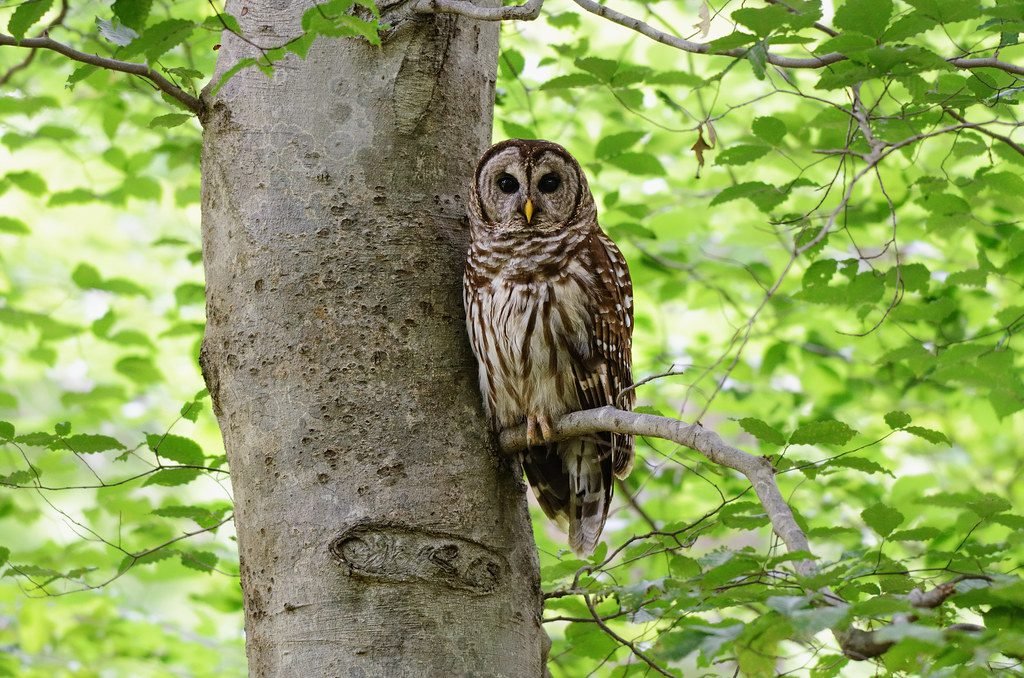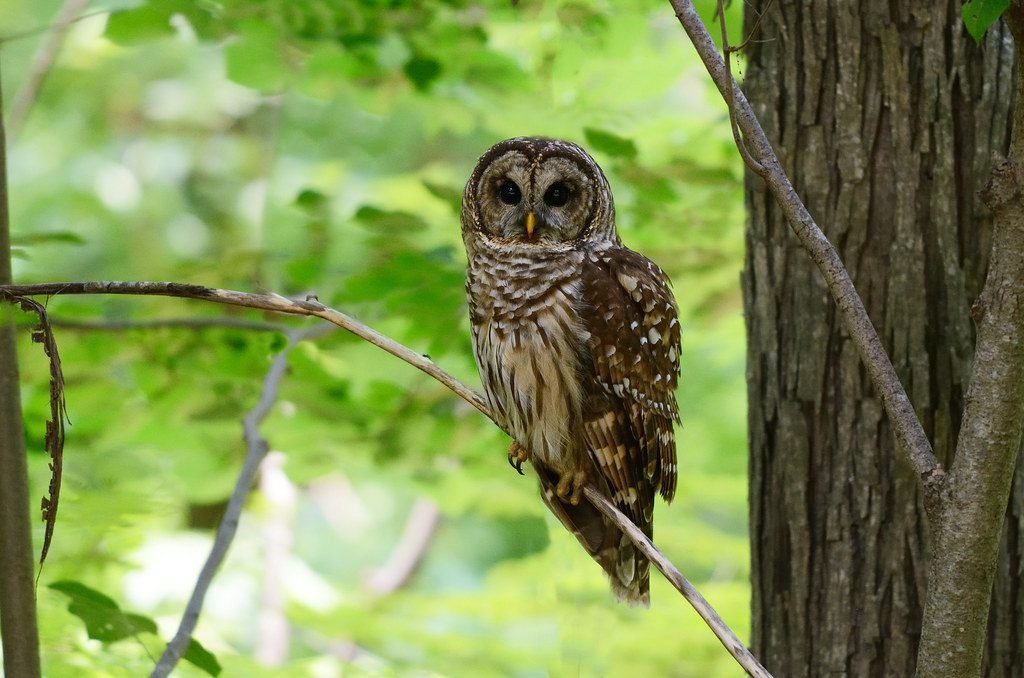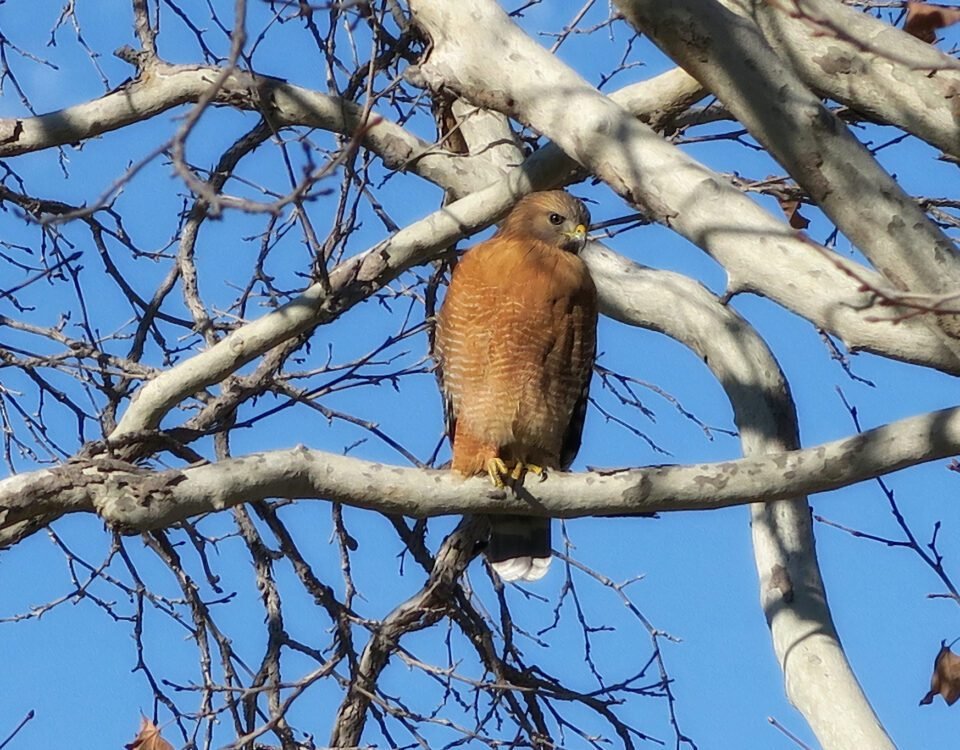


15+ Birds With Small Beaks (Facts & Photos Included)
October 19, 2023


15 Human Foods That Birds Can Eat [Latest Guide 2024]
October 20, 2023Owls, often surrounded by mystery and symbolism, have fascinated humans for centuries. Their nocturnal habits, distinct calls, and sharp gaze make them a subject of intrigue. However, one might wonder if “loyalty and friendliness” is a trait they possess when assessing their behavior. Here’s a quick answer:
Owls are not generally recognized for their loyalty and friendliness towards humans. As wild raptors, they are more naturally inclined to aggressive behaviors rather than pleasant interactions.
To uncover the reality of these nighttime beings, we’ll explore the facts surrounding owl interactions with humans in this article.
Are Owls Loyal To Humans?
Owls are not necessarily loyal to humans. Like most wild animals, they instinctively avoid human contact to ensure their safety and survival.
Their naturally timid nature and nocturnal lifestyle means that encounters with humans are rare. Most owl species are active at night and roost during the day, reducing the likelihood of human interaction. Thus, describing owls as “loyal and friendly” to humans would not be accurate.


Owl on a Tree
Do Owl Like Humans?
Owls are creatures of the wild and don’t possess the capacity to have feelings of liking or disliking humans as we understand these emotions.
However, if owls come into contact with humans from a young age, they might grow more tolerant of human presence, not necessarily viewing them as threats.
That said, even if an owl seems at ease near humans, it’s outside their nature to become overly familiar with people. Engaging with owls or wild animals can pose risks for both parties, given the animal’s innate unpredictability and potential for aggression.


Owl with Human
Reasons Owls Aren’t Loyal
Understanding the concept of loyalty through an owl’s behavior requires recognizing the fundamental differences between human emotions and animal instincts. Here are reasons owls don’t exhibit “loyalty” in the way humans understand it:
Natural Independence
Owls predominantly lead solitary lives, rarely forming prolonged bonds with other creatures, including humans. This natural independence means they don’t possess the tendency to create long-term affiliations or display loyalty.
Survival Instincts
As creatures molded by evolution for survival, owls prioritize behaviors that ensure their well-being. Their actions are guided by instincts rather than emotional attachments, making the idea of loyalty irrelevant to their way of life.
Limited Interactions
Given their nature of avoiding prolonged interactions, even with their own kind, owls don’t develop consistent associations to cultivate loyalty. Their interaction with humans is even more limited, leaving little room for any form of attachment.
Territorial Behavior
Owls are territorial birds, focused more on defending their space than forming bonds. This defensive nature means they are more likely to push away intruders, including humans, rather than develop any sense of loyalty toward them.
Caution Over Connection
Owls are intrinsically alert and cautious. Their primary goal when encountering potential threats, including humans, is to evade or defend rather than connect. This inherent caution impedes the formation of any loyal bond with humans.
The Least Friendly And Loyal Owls
Snowy Owls
Snowy owls are large owls that live in areas near the North Pole but can sometimes be found in the United States and Canada.
Many people believe snowy owls are the most attractive owl species due to their distinct white feathers. However, even though they are pleasing to the eye, they can be aggressive.


Snowy Owls
These owls become defensive, particularly when safeguarding their territory or nests. They can display aggressive behaviors toward humans and even larger animals like wolves that approach their young.
If you are near a snowy owl nest, keeping a safe distance is recommended to prevent any potential conflicts.
Barred Owls
Barred owls are known to make a lot of noise, but they are also considered one of the least approachable owl species regarding human interactions. Their behavior should not be taken lightly.
In the time when they are nesting, barred owls become very territorial. They can attack if they sense a potential danger, especially to their young.


Barred Owls
Their attacks often focus on the face and hands of the perceived threat.
Female barred owls are incredibly protective of their young ones. They will defend against intruders, no matter how big or small.
Great Horned Owls
Great horned owls, often called tiger owls, rank among the biggest owl species globally. They are known for their strong hunting abilities, capturing and eating animals like snakes, rabbits, hawks, reptiles, and even other owl species.


Great Horned Owls
Found in both South and North America, these owls are considered by many to be one of the most aggressive owl species.
They prefer to be alone, are territorial, and can become aggressive. Great horned owls, including humans, will defend their space from any potential threats.
Can Owl Serve As Good Pets?
Many people wonder if owls can be kept as pets due to their seemingly charming appearance. However, there are multiple reasons why they aren’t suitable for domestic life.
- To start, owls demand intensive care. Being meat-eaters, they require fresh meat daily, which can be expensive.
- Remember, owls are nocturnal. They’re active during nighttime and can produce significant noise, especially during their breeding season.
- Owls also have the potential to be destructive indoors. Their sharp claws can quickly harm furniture and other household items.
- Moreover, it’s worth noting that keeping owls without specific training and proper permits is generally illegal. They are protected species, and only licensed individuals can own them.
- Most importantly, owls can pose risks. Being instinctive predators, they can inflict serious injuries. Hence, while having an owl as a pet might sound intriguing, it’s likely not a wise decision.
Do Owls Exhibit Affection Towards Humans?
Owls are not generally perceived as animals that show affection to humans. As wild creatures, they don’t form emotional connections with people.
Nonetheless, in captivity, owls might display actions like grooming, preening, or nuzzling, which humans might perceive as signs of affection. However, these actions relate to feather maintenance and social communication more than genuine, affectionate sentiment.


Owl on Human Hand
Can Owls Identify Human Faces?
Research has indicated that certain bird species, such as crows, mockingbirds, and magpies, can recognize individual human faces when in the wild. However, there’s no conclusive evidence suggesting owls possess the same ability to identify human faces.
Do Owls Appreciate Petting?
Owls generally don’t favor being touched or petted, although they might endure it, whether in the wild or in captivity. A primary reason they might resist touch is that it can disrupt the alignment of their feathers. Consequently, birds often avoid being touched and engage in self-grooming to readjust their feathers afterward.
Final Thoughts
In summary, as majestic and intriguing, owls don’t typically form emotional bonds with humans or exhibit affection or loyalty in ways we might understand. Their behaviors are driven by instinct and necessity rather than sentiment. Recognizing and respecting their wild nature ensures a harmonious coexistence between humans and these magnificent night birds.



